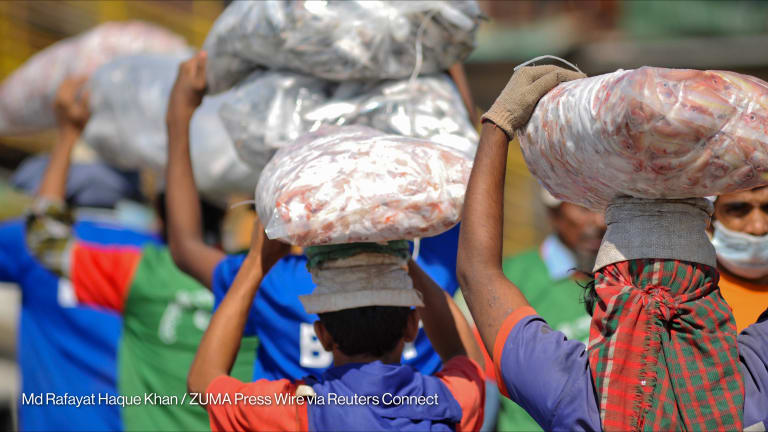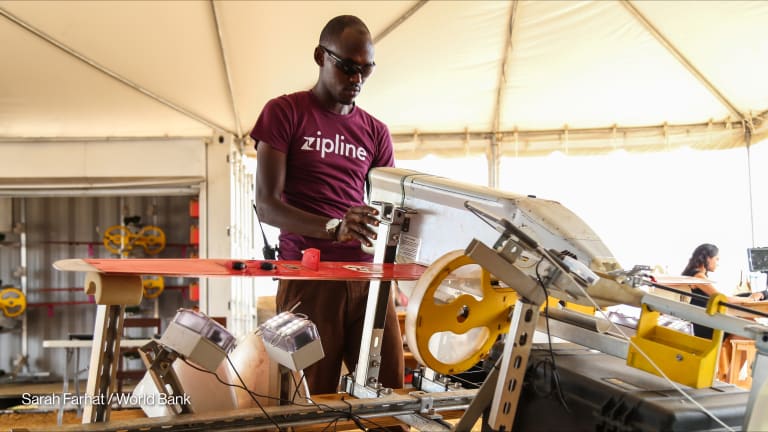Supply chain sourcing in fragile states: Lessons from Sainsbury in DRC

A challenge grant-funded project in the Democratic Republic of the Congo has shown skeptics that public monies going to support private companies can work — and well.
Through the Food Retail Industry Challenge Fund, a U.K. Department for International Development-funded initiative, the Sainsbury’s supermarket chain helped build up the coffee sector in the Congo — developing a new source for their supply and transforming lives at the same time, according to those involved.
While the Congo’s coffee had a good reputation in the 1960s, decades of conflict resulted in there being virtually no coffee exports 10 years ago, other than what was smuggled across the border to Rwanda.
But five years ago, with the support of a FRICH grant, Sainsbury’s, its roaster Finlays, and TWIN, a nonprofit organization that works with small-holder farmers, partnered to see if they could both boost the quality and production of coffee to levels that would allow international companies to add Congolese coffee farmers to their supply chain.
The partnership’s progress
The Sainsbury’s Congolese partnership is a “fairly spectacular success,” according to Mark Thomas, a director at Nathan Associates London Ltd who leads the management of FRICH. “It is a high-risk area, a difficult place to do business. By enabling Sainsbury’s to overcome costs, we’re now connecting farmers to top-end [markets].”
Indeed the conditions in the Congo make it difficult to work — so difficult that without the FRICH grant, it’s unlikely that Sainsbury’s would have undertaken the project.
“For us, the challenge fund has been a really useful mechanism,” said Laura Falk, Sainsbury’s ethical trade coordinator. “It has been a catalyst for us to work on projects we might not have worked on otherwise.”
The connections made with other partners were critical because security challenges and insurance restrictions meant that Sainsbury’s officials could not visit the Congo and had to rely on TWIN to manage the project on the ground, she said.
TWIN’s Rwanda-based team is in touch daily with the coffee cooperative SOPACDI, which has been expanded through this project, and meets with them weekly to monitor processing and production, according to Nicolas Mounard, TWIN’s managing director.
The SOPACDI cooperative, which had about 240 members when the project started and was not exporting any of its coffee, now has about 5,000 members and is exporting thousands of tons of coffee a year to approximately 10 international companies, and getting about a dollar above the market price for every sale.
Farmers are now making approximately 70 percent more income than they did before the project, which has given them the ability to invest in diversifying their crops, start small businesses and pay for health services, Mounard said.
It takes a large investment to rejuvenate the coffee industry in the Congo, but the risk is shared through this type of partnership, which makes it possible for all of those involved, he said.
This project has been so successful — what Mounard called a “best practice” — project, in part because from the start it was based on the market demand for the product and incorporated all the stakeholders in the value chain.
“At the end of the day, my point of view on the ground is a lot of development projects are implemented without really having in mind the market dynamic, he said. “If you develop the coffee cooperative but don’t know the market or how to market or what the market brings, it doesn’t really make sense.”
Now, despite the FRICH grant officially ending, TWIN continues to work with the local coffee communities, now using the same model with the Muungano coffee cooperative and potentially with others. In addition, TWIN will work to scale the gender component of the program and try to systematize some of the innovative programs developed to allow women to diversify how they support their families, including by starting additional businesses.
“For us this kind of model with a public-private partnership is exactly the kind of thing we’d like to duplicate,” Mounard said. “For us making that link between consumer expectation, retailer expectation and what’s going on on the ground that is key.”
Lessons learned, and the future of challenge grants
Development projects looking to work on supply chains need to consider market dynamics from the start and encourage continued communication. And even though the challenge grant initiative, designed to help connect African farmers to global markets, has run its course, it managed to do just that.
Sainsbury’s will continue to source coffee from the Congo, and is open to more opportunities to source from a similar supply base, Falk said. FRICH provided a great opportunity to learn from other companies working on similar projects and is a good example of the power of governments to serve a role of bringing together partners and sharing lessons learned, she said.
As the official project wraps up in the DRC, the funding mechanism, FRICH is also closing up shop. The team is conducting final reviews on all of its projects.
There is an ongoing debate within DfID about when and how to use challenge funds and in what situations other tools may be more effective, Thomas said. While challenge funds may continue to be one tool in market development programs, DfID will look to new, likely varied, programs in this space, he said.
The FRICH program “at the very least whetted the appetite” of companies and organizations based in the U.K. and Europe in expanding within as well as sourcing and trading in Africa. Almost all of the 74 organizations that were involved in the four rounds of FRICH funding will continue to pursue opportunities, Thomas said.
“For FRICH I think the overall result is that there are quite a number of new products on the market in Europe that weren’t there before, and companies are committed to sourcing from Africa and small holders, and that’s what we were aiming to achieve,” he said.
Want to learn more? Check out Feeding Development's campaign site and tweet us using #FeedingDev.
Feeding Development is an online conversation hosted by Devex in partnership with ACDI/VOCA, Chemonics, Fintrac, GAIN, Nestlé and Tetra Tech to reimagine solutions for a food-secure future from seed and soil to a healthy meal.
Search for articles
Most Read
- 1
- 2
- 3
- 4
- 5








